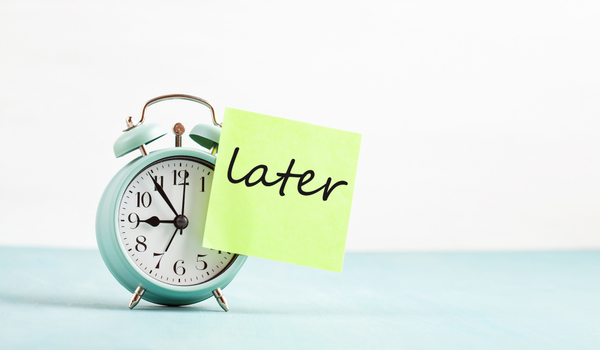
Let’s admit it. We all procrastinate. Sometimes we put things off because we just don’t want to do them. Other times we have too much to do, so we avoid doing any of it.
Procrastination in and of itself is not the problem. In fact, it could be our brains’ way of saying, “Whoa, put the brakes on here. You are doing too much”. But, for individuals with ADHD or executive function challenges, procrastination can become pervasive.
In fact, procrastination is extreme for those with ADHD and executive function deficits. This behavior of putting things off is related to our ability to self-regulate. Our brain’s internal messaging center cues us to take action. Individuals with ADHD have trouble with self-regulation because their brains don’t often pick up on these internal messages. Instead, a person with ADHD often has to rely on external cues in order to initiate an action.
For those individuals who struggle with executive function, putting off a task can also create a challenge. Executive function refers to a person’s ability to plan, organize, and complete tasks. Sometimes, individuals who have executive function challenges may have trouble activating. For example, the message in their brain may be telling them to do something, like “start my homework” but their executive dysfunction may not get them to actually start.
Instead of looking at procrastination as a deficit, perhaps it is better to characterize it as a tool for relieving stress.
Procrastination and Homework
What does procrastination look like for students with ADHD and executive function challenges? Parents often tell me that, instead of doing homework, their children turn to screens. This makes sense since the ADHD brain looks for stimulation and interest. Video games, social media, YouTube, or even binge-watching a favorite show are all forms of procrastination. Because all of these activities are much more stimulating than homework, the ADHD brain can focus on them more readily.
However, procrastination looks different in everybody. Sometimes, it really is about doing anything but the task at hand – this is especially true for students when it is time to complete their homework. I have one client who goes for a run, then goes out again to take the dog for a walk. Another client just lays on his bed and stares into space for hours.Procrastination and ADHD have many faces, but the common thread is that needed tasks are not getting done.
Managing Procrastination
Have a look on the internet and you will find many articles on how to manage procrastination. All are useful, at times. But there is so much more to procrastination than following a list of tips. As an ADHD and executive function coach, I find procrastination to be one of the most difficult challenges to overcome. I believe this is because of two reasons. First, it is so easy to slip into the habit of putting things off. Second, and more importantly, students with ADHD and executive function challenges truly believe that they will be able to get to work just by telling themselves that they need to do it.
Avoiding procrastination takes diligence. Moreover, it takes a system. Just hoping it will go away is not likely to work. Instead of targeting procrastination as one thing to overcome, it should be part of the bigger picture in dealing with all of the challenges of ADHD.
Normalizing Procrastination
When I first begin working with a student, we set goals. In doing so, we talk about the individual’s strengths and challenges . Almost always, a student names procrastination as one of their primary challenges, and when setting goals, they say they want to “avoid procrastination”.
But the reality is that procrastination in some form is unavoidable. We all put things off at times, and we all struggle to get started on certain tasks. So instead of viewing procrastination as something that should be avoided at all times, perhaps we should change the message.
Instead of looking at procrastination as a deficit, perhaps it is better to characterize it as a tool for relieving stress. In what is a highly stressful world, our brains might need a break from a hard or uninteresting task. Embarking on a less stressful task, or just taking a brain break can be a good thing and may actually lead to more productivity.
Procrastination in Moderation
If procrastination can be viewed as a tool rather than a fault, it can be managed. In moderation, procrastination can be used to boost the working memory that is needed to complete a task. With “planned” procrastination, the student can return to their work with their attention refreshed and they can work for a longer period of time.
Here are 8 tips on how to moderate procrastination:
- Understand your form of procrastination. When you procrastinate, take notice of exactly what you do. Do you turn to Netflix or YouTube? Or scroll through your social media apps? Or do you fall asleep on the sofa? Knowing what you do when you procrastinate can help you to limit the time you spend doing it.
- Consider the “why” of procrastination. Take the time to think about why you procrastinate. Do you feel stressed? Are you practicing avoidance because the homework is boring or difficult? Are you just tired? Knowing the why can help you to make a plan around it. If you cannot figure out why, that is OK too. Just noticing is a step in the right direction.
- Take a look at your energy levels during the day. Has procrastination become a habit that you do each and every day at about the same time? Many students like to come home from school, or shut down their virtual class, and then take a much-needed break. Then they can’t get started. Take note of whether or not this is a habit, or if your energy levels are truly depleted, or even if your medication is wearing off. Knowing how your body feels is important. It may be telling you that you need to energize it by exercising or eating.
- Embrace the “Do It Now” approach. If procrastination is pervasive, start to change the messaging in your head. Try to get into the habit of asking yourself, “What will I do now” rather than “I should do this now”. The change of messaging can create activation.
- Break your work down into smaller tasks. If stress or feeling overwhelmed is a factor, take some time to do a little planning. Maybe plan on doing 5 math problems at a time or writing a supporting paragraph first. As you develop these plans, you can use them over and over again. It is helpful to write them down so that you can refer back to them.
- Find your “ideal” environment. Look around you. Have you created a place where you actually want to go to complete your work? If you are working at a desk, create an organization system that allows you to get started. And, make your work area interesting. If you have a favorite picture, or you like plants, create a happy environment where you will be drawn to do your work.
- Visualize the process. Students are really good at coming up with plans on how to moderate their procrastination. They just cannot follow through. Visualizing the steps you will take is highly effective in creating activation.
- Make it sustainable. By using all of the steps above, you can develop a plan that will be long-lasting and sustainable.
Procrastination is often tied to the feeling of overwhelm. For a student with ADHD, procrastination can occur at any time, not just when the assignments pile up. Even if homework involves only one assignment, an ADHD student can habitually put it homework off, even to the extent of not getting it done at all. Day in and day out.
If you or your child needs assistance with dealing with procrastination, you might consider working with an ADHD and executive function coach. I can help you and your child put appropriate strategies in place so that you both feel you have a plan that keeps you moving forward. If you are interested in having a conversation with me, just schedule a Welcome Call here.



